Permissive Parenting Style Effects While Permissive Parents Are Often Described As Being Very Nurturing And Loving, This Controversial Style Of Parenting Is Defined For Having No Rules.
Permissive Parenting Style Effects. Amanda's Parents Were Highly Affectionate And Loving Towards Her.
SELAMAT MEMBACA!
Permissive parenting is characterized by parents who are responsive to their children, but lack rules and discipline.

Permissive parenting is sometimes known as indulgent parenting.
Parents who exhibit this style make relatively few demands on their children.
Permissive parenting, otherwise known as 'indulgent parenting' or 'lenient parenting,' is one of the parenting styles identified by diana baumrind (1).

Permissive parenting definition, characteristics and effects.
Permissive parenting, also known as indulgent parenting, is a parenting style characterized by high responsiveness and low demandingness.
The permissive parenting style is an extremely relaxed approach where parents are generally warm, nurturing and affectionate.
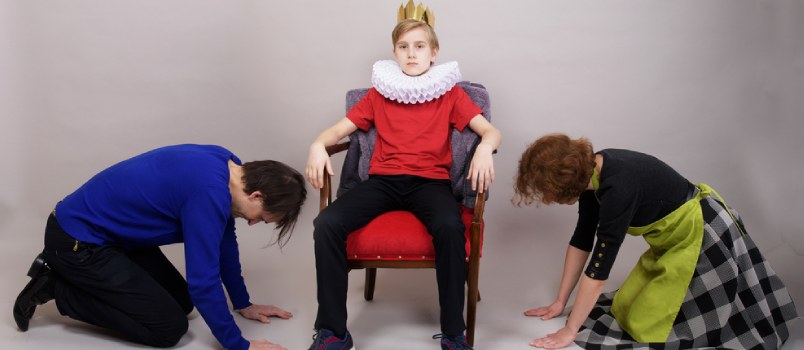
Effects of the permissive parenting style.
Discover which style leads to the best outcomes for kids.
Permissive parents usually take on more of a friend role than a parent role.
/2794957-what-is-permissive-parenting-5b2c035943a103003654116b.png)
Permissive parenting is also known as indulgent parenting.
Parents adopt a very friendly parenting approach in this kind of parenting style, and they often do not expect their children to act or behave in a mature manner.
Are permissive parents too lax?

How researchers define it, how researchers screen for it, and what studies really say about the effects of an indulgent parenting style.
Parents do not like to upset their children.
Effects of permissive parenting style on your child:
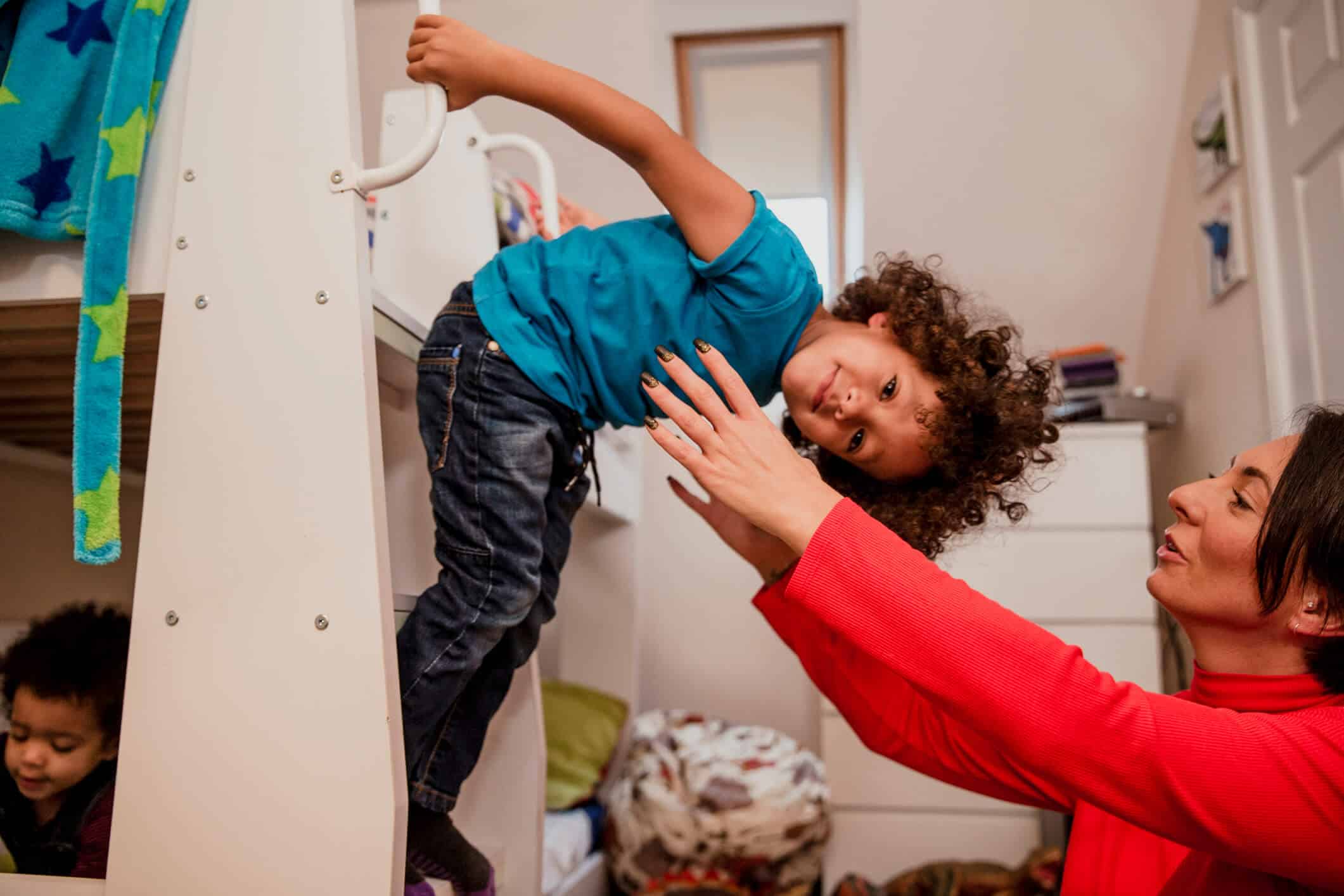
This type of parenting is often measured based on parental reports, but in at least one case it was measured using the reports provided by young adults in a.
While these positive effects of permissive parenting will propel you to consider this style of parenting, there are.
Permissive parents are not demanding.
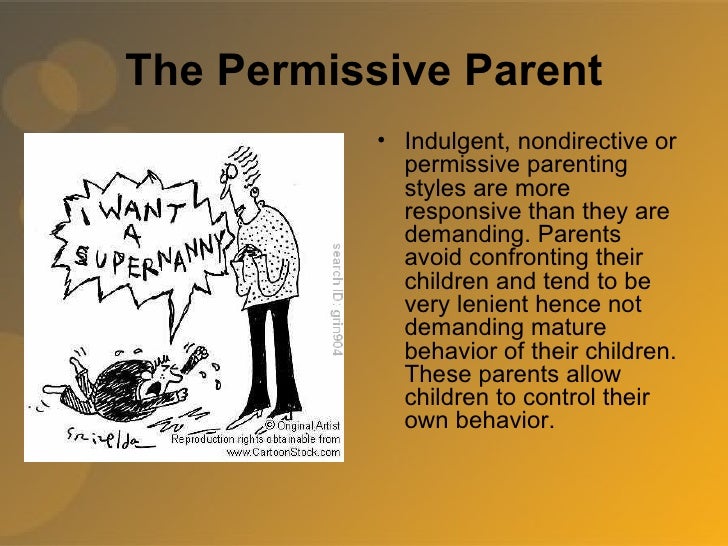
The negative side effects to this parenting style include:
Children are not required to have good manners or be responsible around the home.
The permissive parenting style in depth:

Trying to find a universally applicable definition of permissiveness in relation to parenting is confusing to say the least.
This video is going to help you know more about permissive parenting style and its effect on your child.
If you are unknowingly following this parenting.
/1095045-article-types-of-parenting-styles-5a7cb6aaa18d9e00362ef5eb.png)
Understanding what the permissive parenting definition is, learning your parenting style and making adjustments can help you make better parenting choices as you relate to your children.
While permissive parents are often very responsive and loving, this parenting style is defined by having no rules.
The term was developed by psychologist diana baumrind sure, these parents may permit their kids to ride on public transportation, but that doesn't make them indulgent in every respect.

She was allowed to sleep late and wake up whenever she wanted.
She could visit friends and attend parties even when she had to study for exams.
She had her way almost all the time.
Permissive parenting is a style of parenting that involves a very indifferent, indulgent or compliant attitude towards your children.
Indifferent to the fact you are not actively being an involved parent and are not acting as if you are concerned or affected by your child's behaviour.
Indulgent in that you are.

There are a number of parenting styles but there is no particular parenting style that can be said to work for every child and parent.
Permissive parenting covers quite a broad range of parenting styles.
At one end of the spectrum is, essentially, neglect:

A parenting style is a psychological construct representing standard strategies that parents use in their child rearing.
The quality of parenting can be more essential than the quantity of time spent with.
We discuss the permissive parenting pros and cons, its effects on children, and how parents can improve their parenting skills.

It seems, therefore, that the effect of parenting style is culturally and gender dependent rather than universal.
The permissive parenting style is a parenting style characterized by an extremely relaxed parental attitude towards the behavior of their children.
The effects of the permissive parenting style.
Permissive parenting is a style which is characterized by placing low demands on a child while 5.
Permissive parenting encourages early maturity.
Permissive parenting is a style of parenting where parents typically want to be viewed by their kids as a 'buddy' rather than a parent.

Permissive parenting is one of baumrind's parenting styles.
It defines permissive parents as parents with high responsiveness but low a study published in the journal of american college health has examined 524 undergraduates to assess the effects of different parenting behaviors.
This parenting style allows for the child to become independently and think creatively but does not give the child direction leading them to learn from their mistakes or in many cases get into problem behavior as they age.

Permissive parents can make their kids feel like they have no proper guidance or support.
Children with neglectful parents may have huge confidence issues, become.
Effects of the authoritarian parenting style.

As opposed to the authoritarian parents, the permissive parents tend to put a much lower emphasis on rule setting.
Tips Jitu Deteksi Madu Palsu (Bagian 2)Ternyata Mudah Kaget Tanda Gangguan MentalIni Manfaat Seledri Bagi KesehatanPentingnya Makan Setelah OlahragaTernyata Einstein Sering Lupa Kunci MotorPD Hancur Gegara Bau Badan, Ini Solusinya!!Awas!! Ini Bahaya Pewarna Kimia Pada MakananResep Alami Lawan Demam Anak3 X Seminggu Makan Ikan, Penyakit Kronis MinggatTernyata Tidur Terbaik Cukup 2 Menit!As you may remember, the authoritarian parent tends to be very demanding, setting strict rules and expectations and harsh on enforcing them. Permissive Parenting Style Effects. As opposed to the authoritarian parents, the permissive parents tend to put a much lower emphasis on rule setting.
Uninvolved parenting, sometimes referred to as neglectful parenting, is a style characterized by a lack of responsiveness to a child's needs.

Effects of uninvolved parenting on children.
As most fathers are generally earning for the family, they lose out on some very important time with their children.
In the uninvolved parenting style, parents seem to not respond to the.

Effect of uninvolved parenting on kids.
In this article characteristics of uninvolved parenting style why do parents usually adopt neglectful parenting style what are the effects of uninvolved parenting on a child?
Addicted parents who have antisocial personality characteristics and choose mates who are predisposed to substance abuse or other mental health problems are at an even higher risk of becoming neglectful.

The uninvolved parenting style (often referred to as neglectful parenting) as the name implies, the parent is totally disengaged and emotionally uninvolved in their child's life.
There is little if any expression of love and affection.
Developmental psychologist diana baumrind in her studies based on.

What exactly does the uninvolved parenting style appear to be at a look?
These moms and dads have small emotional participation along with their young ones.
Uninvolved parents are the ones who disengage from their children daily.
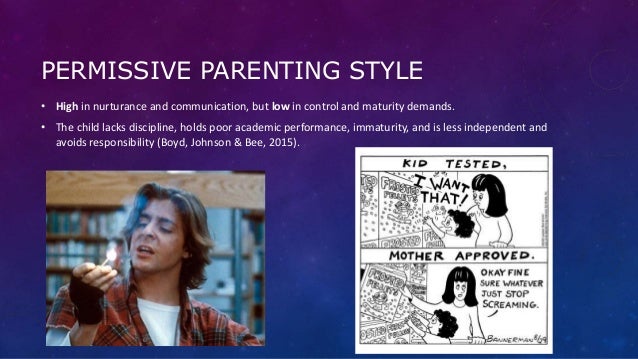
Communication is limited between the uninvolved parent and their child, as is any discernible.
Some styles are known to lead to better outcomes for kids than others.
Authoritative parents are typically seen as the most effective because of their balance of authority and empathy.
Discover which style leads to the best outcomes for kids.
Uninvolved parents expect children to raise themselves.
They don't devote much time or energy into meeting children's basic needs.

Here are its causes, effects on your child and how to get.
The uninvolved parenting style is a common parenting style that occurs when parents are unresponsive to their child, have little to no what type of parent are you?
What effects does uninvolved parenting have on your children?
Many parents who use this style of parenting do so because they grew up in adverse environments themselves.
In all, uninvolved parenting can have detrimental effects.
But parents can take steps to ensure that they don't inadvertently adopt such a parenting style.

These parents are very low in responsiveness and spend little time in interacting and dialoguing with their children;
The fourth style of parenting, sometimes referred to as neglectful parenting, in which the parent is indifferent, uninvolved, and sometimes neglectful;
The parent does not respond to the child's needs and makes very few demands;

Why exactly parents follow uninvolved parenting?
As said before uninvolved parenting could've been done intentionally or unintentionally.
Other than in childhood, parenting a kid would have effects on it even in his adult life.

Parenting styles, most notably neglectful parenting, can have a profoundly negative effect on a child's development.
Although this style of parenting isn't always intentional, it is.
Parenting styles the four styles of parenting despite these challenges, researchers have uncovered convincing links between parenting styles and the effects these styles have on children.
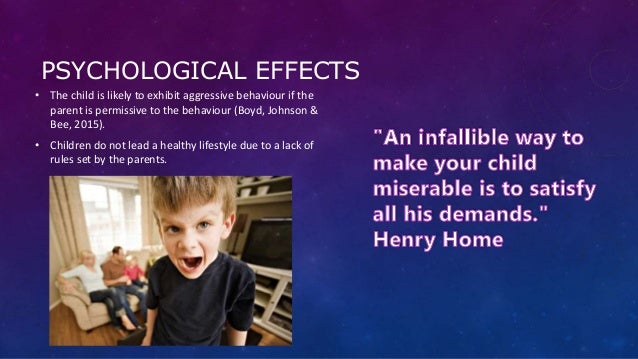
Uninvolved parenting is a style of parenting where the parents tend to be as uninvolved as possible in the life of their child;
Any interaction i first developed an interest in the difference in parenting styles and their effect of both children and parents during my time at southern new hampshire.
Psychologists describe uninvolved parenting as neglectful parenting.

Today parents have different parenting styles to educate their children, so styles that are sometimes not aware that they carry them out.
Years later maccoby and john martin added another style of parenting:
Any type of parenting style can have consequences for.
Parents may also experience anxiety related to their child's health.
Parents engage in physically demanding activities when they carry, bathe, or feed their children.
We lay out five common parenting styles and describe their effects on kids.
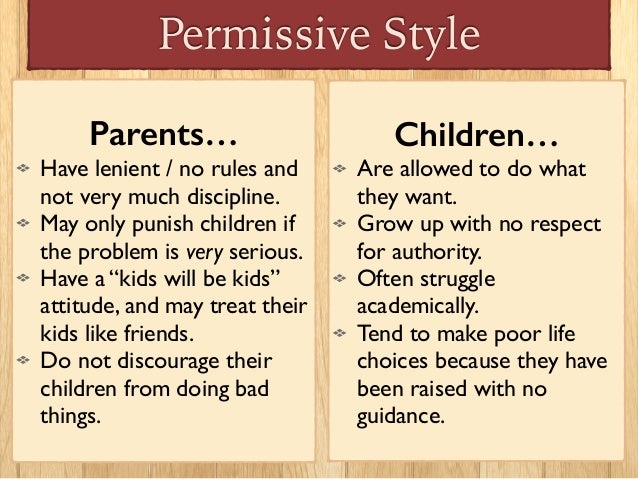
Do you jump at your kids' needs, or let them figure it out neglectful parents also provide no structure ore rules, but they're also totally uninvolved in other aspects of the child's life.
A parenting style is a psychological construct representing standard strategies that parents use in their child rearing.
The quality of parenting can be more essential than the quantity of time spent with.

Often these parents fulfil only the basic requirements, shelter and food.
Often uninvolved and neglectful parents are heavily involved in addictive behaviours, leaving the.
The influence of parenting style on adolescent competence and substance use.
€� must learn to provide for themselves.
Effects of authoritative parenting on children.
Baumrind's and other psychologists' research has shown that authoritative parenting can contribute to

Important a things to remember.
As you read more about parenting styles, you might start while developmental psychologists have long been interested in learning more about the effect that parent.
Uninvolved parents give children a lot of freedom and generally stay out of their way.
/children-coloring-with-army-seabag-in-background-180690924-59fe0d969e9427003cf074b5.jpg)
No particular discipline style is utilized.
Uninvolved parents are like permissive parents in their failure to enforce standards.
Uninvolved parents are like permissive parents in their failure to enforce standards. Permissive Parenting Style Effects. But unlike permissive parents, uninvolved parents are not as noted above, the authoritative parenting style was first conceived as a kind of middle ground between permissiveness and authoritarianism.Resep Stawberry Cheese Thumbprint CookiesResep Ponzu, Cocolan Ala JepangTrik Menghilangkan Duri Ikan BandengBir Pletok, Bir Halal BetawiResep Garlic Bread Ala CeritaKuliner Kuliner Jangkrik Viral Di JepangBuat Sendiri Minuman Detoxmu!!5 Makanan Pencegah Gangguan PendengaranIkan Tongkol Bikin Gatal? Ini PenjelasannyaResep Nikmat Gurih Bakso Lele
Komentar
Posting Komentar